What Is the Meaning of Babylon in the Bible? Corruption
In the Bible, Babylon embodies moral corruption, divine judgment, and human pride. It originated as a significant Mesopotamian power and is prominently featured in Old Scriptures narratives, especially during the Babylonian Captivity.
Prophetic texts depict Babylon as an instrument of divine judgment and a symbol of societal decay. It serves as a prophetic metaphor for idolatry, oppression, and rebellion against God.
The collapse of Babylon underscores the triumph of divine justice over human hubris. In the New Scriptures, Revelation casts Babylon as ‘Babylon the Great,’ symbolizing ultimate worldly decadence.
Exploring its layered biblical significance reveals more about its archetypal role.
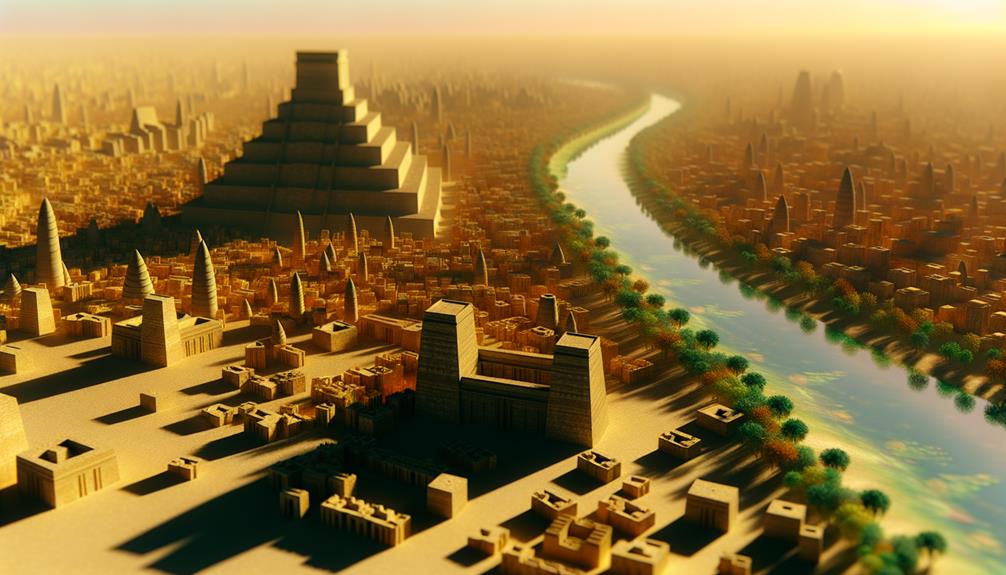
Meaning of Babylon in the Bible: Symbolism, History, and Prophecy
| Aspect | Description |
|---|---|
| Historical Context | Ancient city and empire in Mesopotamia (modern Iraq) |
| Key Biblical References | Genesis 11:1-9, Daniel 1, Revelation 17–18 |
| Literal Meaning | Derived from “Babel,” meaning “confusion” |
| Symbolic Significance | Represents pride, idolatry, corruption, and rebellion against God |
| Spiritual Insight | A warning of spiritual decay and God’s judgment on ungodly systems |
Origins of Babylon
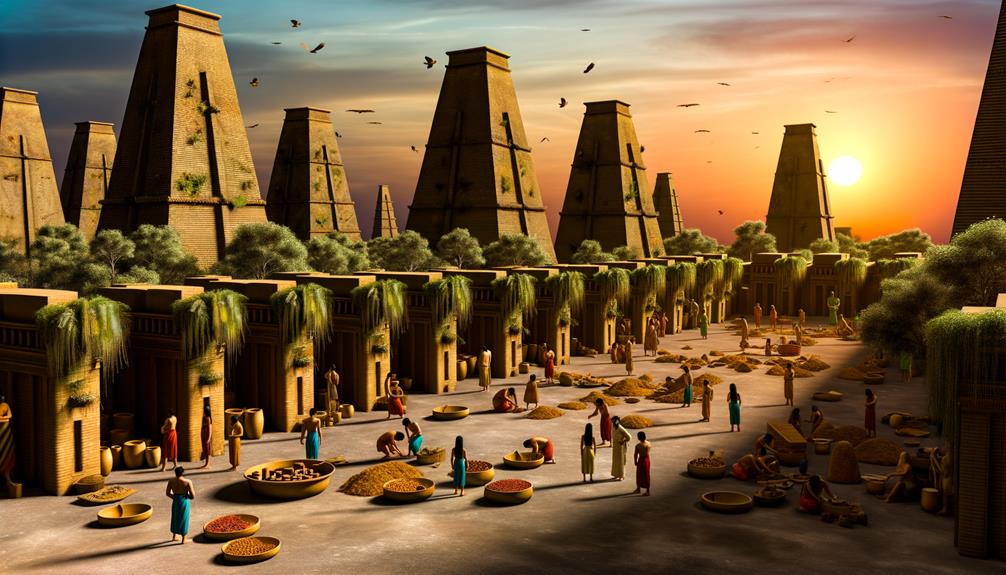
The origins of Babylon can be traced back to the early Mesopotamian civilization, where it emerged as a small Akkadian town around the 3rd millennium BCE.
Initially, Babylon was an unremarkable settlement among many in the rich tapestry of Mesopotamian urban development. However, its strategic location along the Euphrates River facilitated trade and cultural exchange, which contributed to its gradual rise in prominence.
By the time of Hammurabi in the 18th century BCE, Babylon transformed into a significant political and cultural center. The city’s development was marked by advancements in law, architecture, and administration, epitomized by Hammurabi’s Code.
This early growth laid the foundation for Babylon’s later historical and symbolic significance.
Babylon in the Old Testament
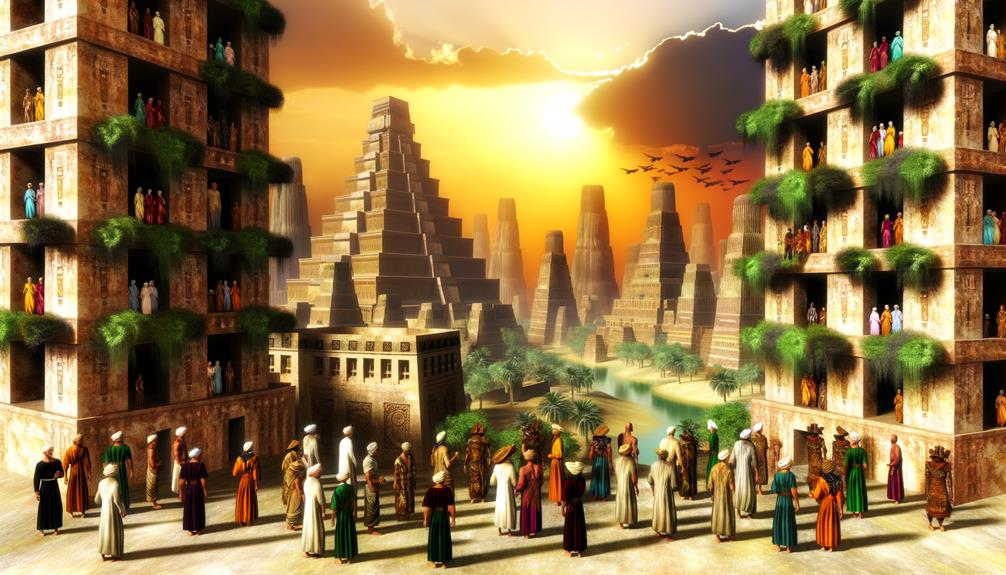
Building upon its historical development, Babylon’s role and portrayal in the Old Scriptures reflect its geopolitical and theological significance during the biblical era.
As a dominant Mesopotamian power, Babylon’s influence is evident in numerous biblical narratives, particularly in the context of Israel’s exile. The Babylonian Captivity (586-538 BCE) marks a pivotal moment, where Jerusalem was conquered, and the Jewish elite were exiled.
This event is chronicled in books such as Kings, Chronicles, and Jeremiah, which depict Babylon as both a tool of divine judgment and a symbol of oppression.
Moreover, prophetic texts, including Isaiah and Daniel, often reference Babylon, highlighting its role in eschatological visions and God’s overarching plan for Israel and the nations.
Symbolism of Babylon

The symbolism of Babylon in the Bible is multifaceted, often representing moral corruption and serving as a prophetic metaphor.
In various scriptural contexts, Babylon is depicted as a center of idolatry and depravity, symbolizing humanity’s estrangement from divine principles.
Furthermore, prophetic texts employ Babylon as an allegory for future judgments against pervasive wickedness and societal decay.
Babylon as Moral Corruption
Throughout biblical literature, Babylon frequently symbolizes the epitome of moral corruption and decadence. This city is depicted as a place where ethical decay and spiritual degradation flourish, providing a stark contrast to divine values.
Three key aspects highlight this symbolism:
- Idolatry: Babylon is often described as a center of idol worship, diverting faith from God to man-made deities.
- Immorality: The city’s lifestyle embodies excess, indulgence, and moral neglect, undermining righteous living.
- Oppression: Babylon’s oppressive regime exploits the vulnerable, reinforcing its image as a morally corrupt entity.
Babylon in Prophecy
In biblical prophecy, Babylon emerges as a powerful symbol of impending judgment and divine retribution. The Book of Revelation portrays Babylon as ‘Babylon the Great,’ a harlot representing the epitome of worldly decadence and opposition to God’s will (Revelation 17:5).
This prophetic depiction is not just a reference to the ancient city but serves as an allegory for corrupt systems and nations that defy divine authority. Furthermore, Babylon’s predicted downfall symbolizes the ultimate triumph of divine justice over evil.
Isaiah and Jeremiah also prophesied Babylon’s destruction, emphasizing its role as an instrument of God’s judgment against Israel, yet destined for its own demise (Isaiah 13:19; Jeremiah 51:58).
Consequently, Babylon encapsulates the cyclical nature of moral decay and divine intervention.
Babylon and Human Pride

Babylon epitomizes human pride by symbolizing mankind’s desire for self-glorification and independence from divine authority. This ancient city, often referenced in biblical texts, represents the pinnacle of human ambition and arrogance.
The story of the Tower of Babel (Genesis 11:1-9) illustrates this vividly, where humanity’s effort to build a tower reaching heaven demonstrates:
- Self-Exaltation: The pursuit of personal glory rather than honoring God.
- Defiance: Deliberate opposition to divine will and order.
- Unity in Rebellion: Collective human effort to assert autonomy from God.
Babylon’s narrative serves as a cautionary example, highlighting the perils of pride and the futility of seeking greatness apart from divine guidance.
This theme underscores the biblical perspective on human limitations and the importance of humility.
Babylon’s Rebellion Against God
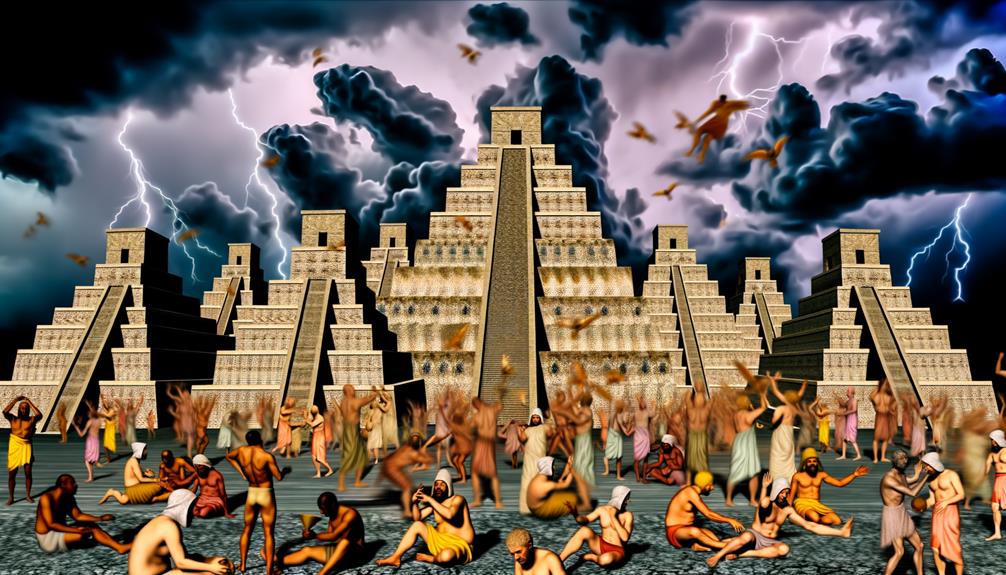
Babylon’s rebellion against God is vividly illustrated through the narrative of the Tower of Babel, where human ambition sought to rival divine authority.
This defiance is further exemplified by the idol worship practices that permeated Babylonian culture, directly contravening the monotheistic tenets of the Bible.
Prophetic judgments, articulated by figures such as Isaiah and Jeremiah, underscore the consequences of Babylon’s persistent insubordination against divine will.
Tower of Babel
The story of the Tower of Babel, found in Genesis 11:1-9, serves as a profound illustration of humanity’s collective defiance against divine authority.
This narrative highlights several key aspects of early human civilization’s hubris and subsequent divine intervention:
- Unity and Ambition: The people spoke a single language and aimed to build a tower reaching the heavens, symbolizing their desire for self-glorification.
- Divine Response: God intervened by confusing their language, thereby halting construction and scattering them across the earth.
- Symbolism: The tower represents human pride and the futility of attempting to usurp divine sovereignty.
This passage underscores the biblical theme that human endeavors devoid of reverence for God are ultimately doomed to fail.
Idol Worship Practices
Building upon the theme of defiance against divine authority illustrated by the Tower of Babel, the practice of idol worship in ancient Babylon further exemplifies the city’s persistent rebellion against God.
Idol worship in Babylon was not merely a religious activity but a cultural cornerstone, where deities like Marduk were venerated through elaborate rituals. These practices contravened the monotheistic worship mandated by Yahweh, thereby symbolizing a broader rejection of divine sovereignty.
The Bible frequently condemns such idolatry, underscoring its spiritual and moral implications. Babylon’s pantheon, characterized by anthropomorphic gods and celestial worship, starkly contrasted with the biblical commandment against graven images, thereby reinforcing Babylon’s role as an archetype of sin and rebellion within scriptural narratives.
Prophetic Judgments
Prophetic judgments pronounced against Babylon in the Bible serve as stark warnings of the consequences of defiance against divine authority. These judgments are vividly depicted in several scriptures, highlighting the repercussions of Babylon’s rebellion.
Key prophetic declarations include:
- Destruction and Desolation: Isaiah 13:19-22 foretells the complete ruin of Babylon, rendering it uninhabitable.
- Fall of the Babylonian Empire: Jeremiah 51:58 predicts the collapse of Babylon’s might and its fortresses.
- Divine Retribution: Revelation 18:2-10 details the swift and total judgment upon Babylon, symbolizing ultimate divine retribution.
These pronouncements underscore the theological significance of Babylon as a paradigm of human arrogance and its inevitable downfall in the face of divine justice.
Fall of Babylon
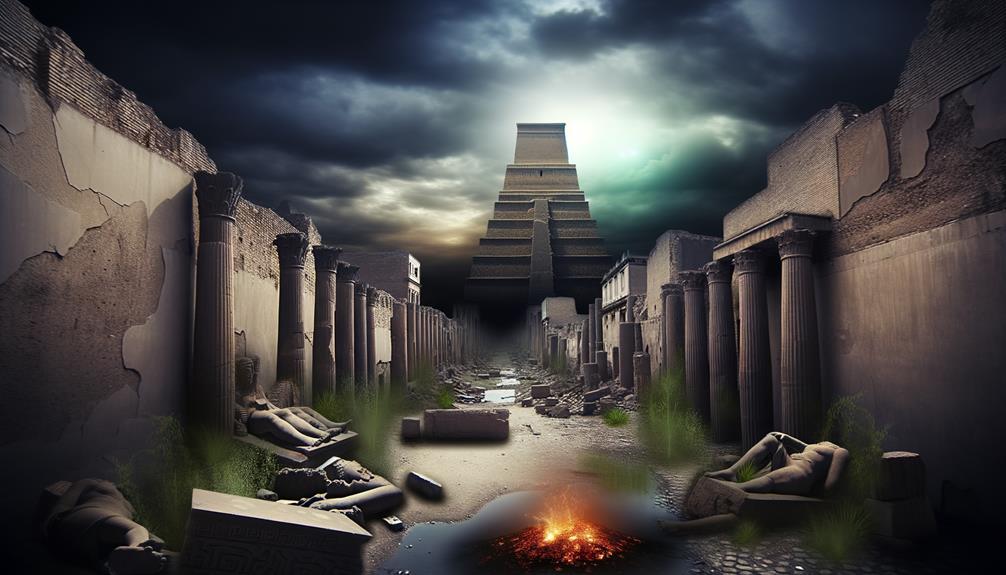
Historians and theologians often regard the fall of Babylon as a pivotal event that reshaped ancient Near Eastern political and cultural landscapes.
The conquest of Babylon by the Persian King Cyrus the Great in 539 BCE marked the end of the Neo-Babylonian Empire. This monumental event is well-documented in historical records, including the Cyrus Cylinder, and is also referenced in biblical texts such as the Book of Daniel and Isaiah.
Theologically, the fall of Babylon is seen as a fulfillment of prophetic judgments against its hubris and idolatry.
Politically, it facilitated the rise of the Achaemenid Empire, leading to significant shifts in regional governance and cultural exchanges, setting the stage for subsequent historical developments in the ancient world.
Babylon in Revelation
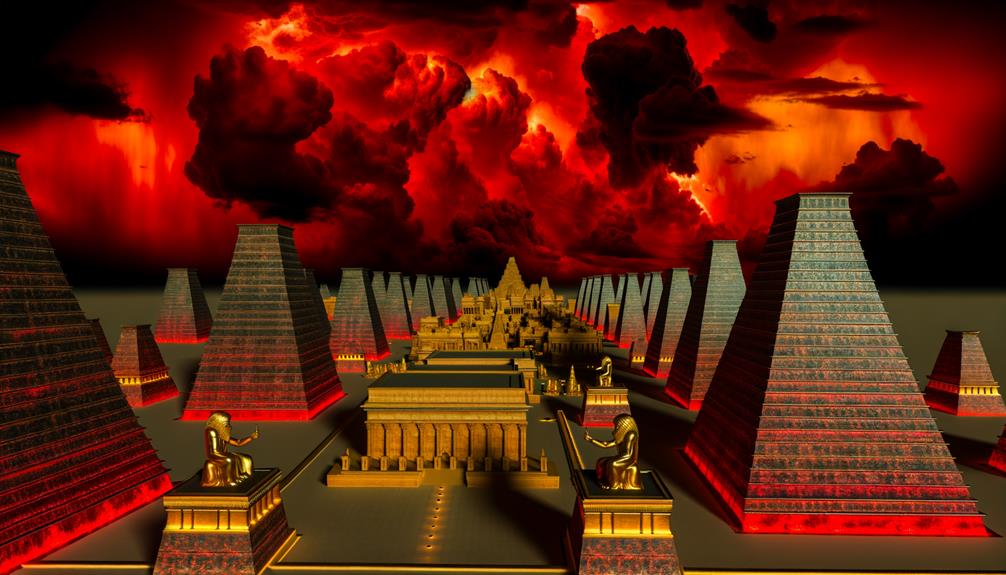
In the Book of Revelation, Babylon is symbolically depicted as a harlot and a great city, representing the epitome of moral and spiritual decay. This depiction serves as a powerful metaphor for pervasive corruption and opposition to divine principles.
The symbolic imagery used includes:
- Harlot: Babylon is described as ‘the mother of prostitutes,’ symbolizing extreme moral corruption.
- Great City: It represents a central hub of economic and political power, often seen as oppressive and exploitative.
- Fall: The dramatic fall of Babylon signifies the ultimate triumph of divine justice over evil.
These symbols collectively portray Babylon as an archetype of an unfaithful society, illustrating the consequences of deviating from spiritual integrity and righteousness.
Lessons From Babylon
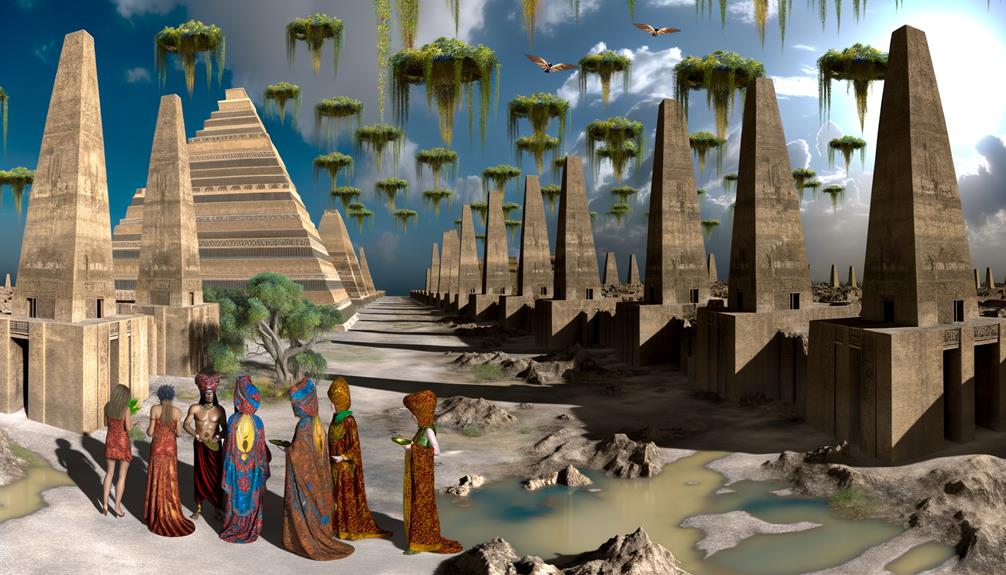
The narrative of Babylon in biblical texts offers profound insights into the perils of deviating from spiritual and moral principles. Babylon symbolizes human pride, idolatry, and the pursuit of power at the expense of righteousness.
The city’s eventual downfall, as depicted in both the Old and New Scriptures, serves as a stark warning against the dangers of hubris and moral decay. By examining Babylon’s fate, readers are reminded of the transient nature of earthly power and the enduring importance of aligning with divine will.
This story underscores the necessity of humility, faithfulness, and ethical conduct, urging individuals and societies to prioritize spiritual integrity over temporal achievements. Fundamentally, Babylon’s legacy is a cautionary tale for all generations.
Conclusion
The narrative of Babylon in the Bible serves as a multifaceted symbol of human pride, rebellion, and eventual downfall. From its origins to its portrayal in Revelation, Babylon epitomizes the consequences of defying divine authority.
Through its ultimate fall, a powerful lesson emerges: the ephemeral nature of human grandeur when set against the eternal sovereignty of God. The tale of Babylon is a cautionary saga, urging reflection on the perils of hubris and disobedience.






